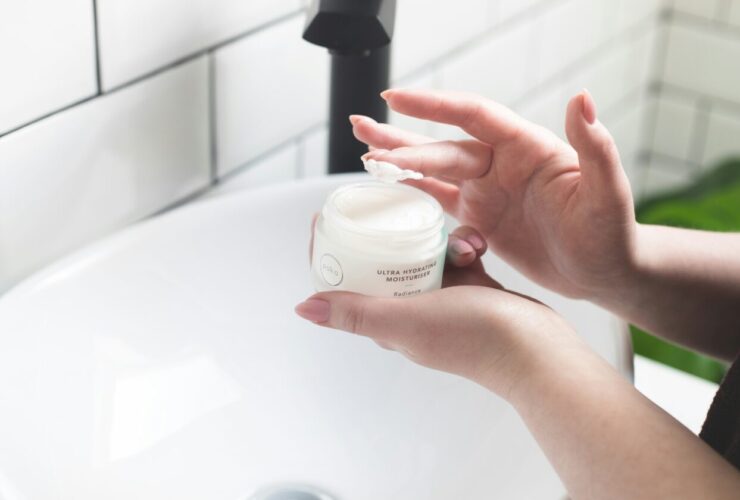Introduction
A frustrating obstacle in pursuing soft, moisturized skin is continual dryness despite careful moisturizing. Many people are perplexed and annoyed by this mysterious phenomenon and seek solutions to return their skin’s natural moisture balance. Even with strict adherence to skincare regimens and meticulous moisturizing, people frequently struggle with dry, flaky, and unpleasant skin, particularly in the harsh winter months. The first step in finding a remedy is to comprehend the root causes and triggers of this confusing problem.
Examining the nuances of dry skin reveals a wide range of elements that make it persistent. Climate factors that deprive the skin of moisture, including indoor heating and cold air, exacerbate dryness by depriving it of its natural moisture. The skin’s delicate moisture barrier is disrupted when abrasive cleansers are used excessively, leaving the face susceptible to inflammation and dehydration. The issue is further exacerbated by internal causes, such as dehydration and nutrient deficits, underscoring the interdependence of interior and exterior variables in preserving ideal skin health.
We will find helpful advice and practical ways for attaining long-lasting hydration as we set out on this trip to solve the mysteries of persistently dry skin. Through comprehension of the underlying reasons and implementation of focused skincare techniques, people can recuperate command over the moisture content of their skin and reinstate its inherent brightness and robustness. Come along with us as we unravel the mysteries of dry skin and set out on a life-changing path to happier, healthier skin.
Understanding Dry Skin
Defining the Dilemma: Known medically as xerosis, dry skin is a common but frequently complex dermatological condition typified by its rough, cracking, and irritating texture. This illness affects people of all ages and genders and people in different demographic groups. Although the odd instance of dry skin is natural, chronic and severe dry skin can seriously impair skin health and quality of life. Comprehending the fundamental causes of dry skin to implement preventative and treatment plans is crucial.
Prevalence and Patterns: Much research has been done on the prevalence and patterns of dry skin, including information from a German study. Research shows that dry skin is a common problem that frequently worsens as people age. Environmental factors, skincare routines, and underlying medical issues can all impact how dry skin appears and develops. Understanding the complex interactions among these elements is essential to creating customized skincare routines and maximizing treatment results.
Examining Contributing circumstances: Various complex circumstances can lead to the onset and continuation of dry skin. Environmental factors like low humidity, severe weather, and prolonged UV radiation exposure can compromise the skin’s natural barrier function. This can increase transepidermal water loss and cause dehydration. Moreover, innate variables such as hormonal changes, genetic susceptibilities, and certain medical disorders like psoriasis and eczema can intensify the symptoms of dry skin. Comprehending the intricate interactions between extrinsic and intrinsic elements is essential to treat dry skin completely.
Exploring Potential Causes of Persistent Dry Skin
Environmental factors: Especially in the winter, ecological circumstances are a significant cause of persistently dry skin. When indoor heating systems are paired with the cold, dry air outside, the skin can lose its natural moisture content, becoming dehydrated and more prone to dryness. The issue is made worse by the low humidity in the air, which compromises the integrity of the skin barrier and increases transepidermal water loss. As a result, people may discover that their skin feels tight and dry even with frequent moisturizing. To effectively treat dryness, specific skincare procedures must be used with an understanding of the effects of environmental factors.
Abnormal Cleaning Practices and Overwashing: Using strong cleaners and overwashing is another typical cause of dry skin. Although maintaining a clean and tidy appearance is crucial for good skin health, harsh cleaning methods and using cleansers with powerful substances can damage the skin’s natural moisture barrier. The skin’s capacity to retain moisture is hampered by this disturbance, which makes it more irritable and dry. Gentle cleansers with moisturizing components can efficiently remove pollutants and debris from the skin without compromising its natural oils. Furthermore, minimizing the frequency of washing is essential for preserving the ideal skin moisture level since it prevents the skin from losing its protective oils.
Internal variables: Skin health and hydration are significantly influenced by internal variables such as nutrition, hydration, and environmental impacts. Dehydration can worsen the symptoms of dry skin by hindering the body’s capacity to maintain an appropriate moisture balance. This can occur from drinking too much alcohol or caffeine or too little water. Similarly, deficits in some nutrients, especially those about critical fatty acids and vitamins like A, C, and E, can impair skin health and exacerbate dryness. Maintaining healthy skin function and hydration requires addressing these internal aspects with adequate hydration and a balanced diet of hydrating foods and vital nutrients.
Navigating Moisturization Techniques
Realizing the Significance of Appropriate Moisturization: By restoring and preserving skin’s natural moisture content, moisturizers are essential for skin health maintenance. Still, there’s more to moisturizing than slathering any lotion over the skin. The kind of moisturizer, how it is applied, and when it is used can all significantly impact its effectiveness. Despite regular moisturizing efforts, Many still experience chronic dryness, which emphasizes the necessity for a greater comprehension of moisturizing methods and optimal practices.
Moisturizing Best Practices: It’s critical to adhere to a few crucial best practices to maximize moisturization and treat dry skin issues. The most important thing to remember is to choose the appropriate moisturizer. Seek for products that help draw in and retain moisture by including moisturizing components like ceramides, hyaluronic acid, shea butter, or glycerin. When selecting a moisturizer, consider your skin type and any particular issues you may be experiencing, such as sensitivity or acne-prone skin. After choosing the right product, use it immediately while your skin is still damp, after a bath or shower. This aids in retaining moisture and erecting a barrier to prevent moisture loss over the day.
Several Moisturizing Methods: To meet the demands of those with chronically dry skin, several moisturizing methods have surfaced in recent years. One such method is “slugging,” slathering the skin in a thick layer of occlusive moisturizer before bed, like petroleum jelly or a thick cream. As a result, skin becomes softer and more moisturized in the morning by forming a barrier that stops moisture loss during the night. “Double moisturizing,” which involves applying a lighter moisturizer first and then a heavier, occlusive product to guarantee deep hydration, is another method that is becoming more and more popular. People can find the best moisturizing regimen for their skin type by experimenting with various techniques and products.
Strategies for Effective Skincare
Accept Gentle Exfoliation: Providing advantages including a smoother texture and improved moisturizer absorption, exfoliation is an essential part of any skincare regimen. Still, finding a middle ground is crucial to avoid worsening dryness. Choose mild exfoliants that remove dead skin cells without irritating the skin, like those that contain enzymes or alpha-hydroxy acids (AHAs). To prevent overdoing it, try to exfoliate your skin no more than twice or three times a week. Excessive exfoliation might interfere with the skin’s natural barrier function and promote moisture loss.
Make Gentle Cleaning Your Top Priority: Cleansing is essential for removing extra oil and pollutants from the skin, but harsh cleansers can remove natural oils from the face, leaving it feeling tight and dry. To counteract this, use gentle, fragrance-free cleansers to cleanse the face without damaging its moisture barrier. Wash your skin no more than twice a day, preferably in the evening, to eliminate pollutants and makeup. Rinse well with lukewarm water to prevent further drying out your skin.
Maintain Internal Hydration: To promote overall skin health, it’s just as vital to concentrate on internal hydration, even while external skincare products are essential for treating dry skin. Ensure you consume enough water throughout the day to keep your body and skin moisturized from the inside out. Consider additional environmental elements, such as low interior humidity during the winter, that may impact moisture levels. Maintaining a humidifier in your house will help the air become more balanced, improving your skin by keeping it from getting too dry and dehydrated.
Revealing Moisturizing Secrets
Important Moisturizing Substances: It’s critical to comprehend the vital substances that may adequately nourish and hydrate your skin to address the continuous dryness of your skin. Antioxidants, such as vitamins C and E, are essential for preventing environmental damage to the skin and encouraging skin regeneration. Lipid molecules called ceramides are naturally present in the outermost layer of the skin and aid in moisture retention and fortifying the skin’s barrier function. Furthermore, oils derived from plants, such as jojoba and argan oil, are abundant in vitamins and fatty acids, offering intense skin hydration and a better overall texture.
Suggested Moisturizers: Products specially designed to meet the demands of your skin should be chosen when choosing a moisturizer to fight dry skin. Dermatologists highly recommend Cetaphil Moisturizing Lotion and Cerave Moisturizing Cream as exceptional moisturizers. Cetaphil Moisturizing Lotion’s non-greasy, lightweight composition makes it perfect for sensitive skin types. Its ingredients, which include moisturizing glycerin, panthenol (vitamin B5), and niacinamide (vitamin B3), combine to calm the skin and replenish its natural moisture barrier. In contrast, ceramides are added to Cerave Moisturizing Cream to reinforce the skin’s barrier and deliver long-lasting moisture. Because it has no smell and is appropriate for dry to dehydrated skin types, sensitive skin can safely use it.
Selecting the Best Moisturizer:
- Consider your skin type, issues, and preferences when selecting a moisturizer.
- Choose fragrance-free products if your skin is sensitive to reduce the chance of irritation.
- Choose moisturizers with rich, emollient textures that offer deep moisture for dry skin.
- Consider the time of year and other environmental elements that could impact your skin’s moisture content.
- Try out various products to see which suits you best, and remember to include regular application of moisturizer in your daily skincare regimen for best effects.
Why Is My Skin So Dry Even When I Moisturize?
A. Short Answer:
Dry skin, despite moisturization, can stem from various factors such as environmental conditions, skincare routine, and internal hydration levels. Moisturizers form a protective barrier on the skin, sealing in moisture. However, if the skin’s natural moisture barrier is compromised or external factors such as harsh weather or excessive bathing strip away moisture, dryness can persist despite moisturization efforts.
B. In-Depth Analysis:
- Environmental Factors: Dry air, particularly in winter months, can sap moisture from the skin, leading to dryness. Indoor heating systems exacerbate this issue by creating low-humidity environments, which can dehydrate the skin. Additionally, exposure to harsh weather conditions, such as wind and cold, can strip the skin of its natural oils, resulting in dryness.
- Skincare Habits: Overuse of harsh cleansers or exfoliants, coupled with inadequate moisturization, can compromise the skin’s barrier function, leading to increased dryness. Additionally, using skincare products with irritating ingredients or failing to moisturize immediately after cleansing can exacerbate dryness.
- Internal Factors: Internal and external dehydration can contribute to dry skin. Insufficient water intake and poor dietary choices can impact skin hydration levels. Certain medical conditions, such as eczema, psoriasis, or thyroid disorders, may manifest as dry skin.
In summary, the persistence of dry skin despite moisturization can be attributed to a combination of environmental factors, skincare habits, and internal factors. To effectively address dry skin, it’s crucial to identify and mitigate these contributing factors. This may involve adjusting skincare routines, incorporating hydrating ingredients into skincare products, maintaining adequate hydration levels, and addressing any underlying medical conditions. By understanding the root causes of dry skin, individuals can tailor their skincare approach to achieve lasting hydration and skin health.
In summary
When treating dry skin that doesn’t go away after moisturizing, a holistic strategy that considers various skincare and lifestyle elements must be used. People can contribute to preserving the skin’s natural moisture barrier by using moderate skincare techniques, such as mild cleansers and avoiding strong exfoliants. Further supporting skin health from the inside out is ensuring optimal hydration through drinking enough water and including hydrating items in the diet. When combined with high-quality moisturizers that contain hyaluronic acid and ceramides, which are nourishing components, this holistic approach can help fight dryness more successfully.
People can take proactive measures to manage recurrent dry skin and obtain lasting hydration if they have knowledge and practical solutions. People can modify their skincare regimens to suit their unique needs by knowing the underlying causes of dryness, which include environmental influences, skincare behaviors, and internal moisture levels. Moreover, customized advice and solutions for treating dry skin can be obtained by consulting skincare specialists like dermatologists or estheticians. People may overcome the difficulties caused by dry skin and maintain healthy, vibrant skin despite environmental challenges by arming themselves with knowledge and taking a proactive approach to skincare.
You can feel confident and at ease even if you have dry skin. To discover the key to long-lasting hydration and glowing, healthy skin, begin implementing these suggestions and techniques right now. Remember to favor gentle skincare techniques, enough hydration, and high-quality moisturizers to address dryness effectively. You can have the radiant, hydrated skin you deserve by taking charge of your skincare regimen and making wise decisions. Begin your path towards enduring hydration and skin health by taking the first step towards healthier skin today.
Reference
Yetman, Daniel. 2021. “Why Your Skin Feels Dry, Even after Moisturizing — and How to Fix It.” Healthline. Healthline Media. August 11, 2021. https://www.healthline.com/health/why-is-my-skin-so-dry-even-when-i-moisturize#possible-reasons.
SkinKraft. 2022. “10 Reasons You Have Dry Skin Even after Moisturizing.” SkinKraft. January 24, 2022. https://skinkraft.com/blogs/articles/why-skin-dry-even-after-daily-moisturization.
Krishna, Kalyani. 2023. “Why Does Your Skin Still Feel Dry Even after Moisturizing? Read Here.” Netmeds. Netmeds. December 20, 2023. https://www.netmeds.com/health-library/post/why-does-your-skin-still-feel-dry-even-after-moisturizing-read-here.
Was this helpful?

Joseph Emb, RDN
Founder of StyleVitally.com | Registered Dietitian & Wellness Advocate
What I Cover:
I’m passionate about connecting nutrition science and everyday wellness to help people live healthier, more vibrant lives. I write about evidence-based nutrition, mindful eating, sustainable lifestyles, and holistic well-being at StyleVitally.com.
My Background:
The University of Texas in Austin, where I earned my Dietetics diploma, laid the groundwork for my nutrition and health career. My training and hands-on experience taught me the science and art of using nutrition to enhance health and well-being.
Professional Journey:
I’m an RDN with lots of experience. I’ve helped people seeking tailored nutritional recommendations in clinical settings and community outreach programs. My constant learning and professional development ensure that my recommendations are always based on the latest evidence.
Ethical Commitment:
My practice prioritizes integrity. My content is transparent and objective, following the most significant ethical standards. I can give my audience unbiased advice because I’m not affiliated with food businesses or industry associations. I want to help people make informed health decisions that match their values and ambitions.
Join Me on the Wellness Journey:
Join me on the path to vitality and well-being, whether facing nutritional issues, seeking sustainable lifestyle changes, or simply wanting a better, happier you. We’ll discover how diet, mindfulness, and holistic well-being can maximize your potential.









